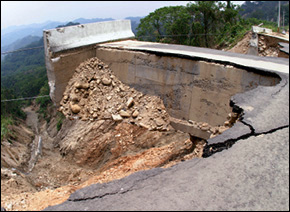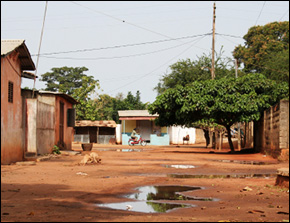Taiwanese Village Blames Water Project for Typhoon Disaster
 A water project in Taiwan is causing widespread discontent in a local community affected by this month’s Typhoon Morakot.
A water project in Taiwan is causing widespread discontent in a local community affected by this month’s Typhoon Morakot.
The angry residents of the southern village of Hsiaolin say that a massive government project that diverts water from a river to a local dam has aggravated the already devastating mudslides that have recently killed hundreds of people in the area, AFP reported Sunday.
The outburst of indignation made it to the highest political level in Taiwan, when angry local residents confronted President Ma Ying-jeou during his visit to Hsiaolin, the symbol of Typhoon Morakot’s devastation. The typhoon hit the village in early August, burying houses and leaving about 400 people missing.
Authorities are investigating claims that dynamite blasting from the construction of a 15-kilometer channel from the Laonung River to the Tsengwen Dam caused erosion that put the village at risk.
“The mountains have been loosened after they were bombed for years day and night,” said Aliao, chief of the nearby Mintzu village. “Previously, we had never had such a disaster. Therefore we’ve good reason to believe that is to blame.”
Carrying the legacy of the previous administration, the project’s future has strong political overtones for the current government that took office in May 2008, after the construction work had already started.
The controversy is also growing as Taiwan’s Water Resources Agency said that the $646 million water project cannot be blamed for the deadly mudslides.
“The allegation that the project is responsible for the huge loss of hundreds of lives is too much for us,” said Chen Shen-hsien, the head of the agency. He added that the project was 11 kilometers away from Hsiaolin.
Meanwhile, around the world the number of massive water transfer projects is predicted to triple by 2020, according to an international study published this month by the World Wildlife Fund (WWF). The report raised concerns that most large projects of this kind do not receive adequate assessment about potential economic, environmental and social impacts.
Read more here.
Source: AFP
, a Bulgaria native, is a Chicago-based reporter for Circle of Blue. She co-writes The Stream, a daily digest of international water news trends.
Interests: Europe, China, Environmental Policy, International Security.







Leave a Reply
Want to join the discussion?Feel free to contribute!